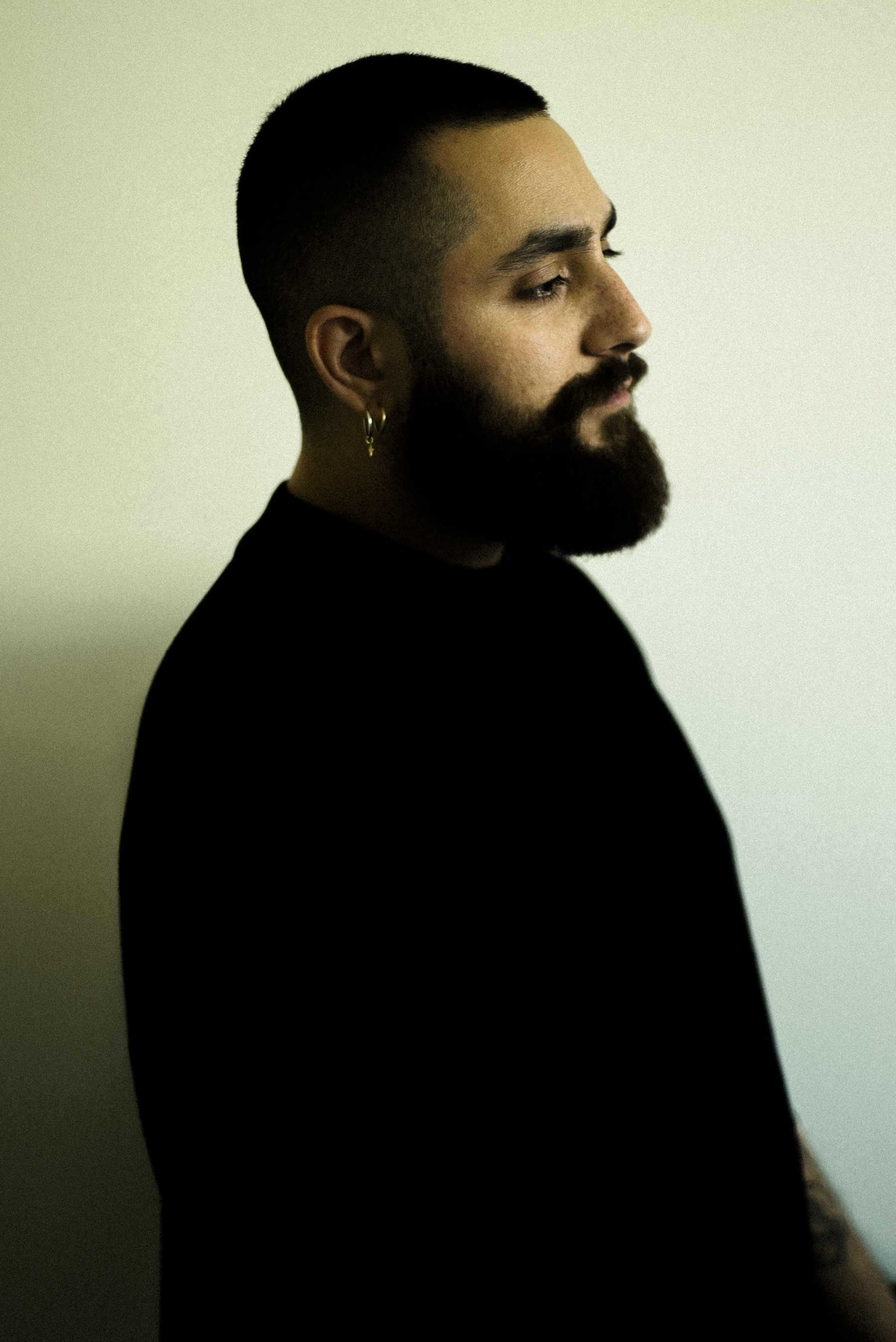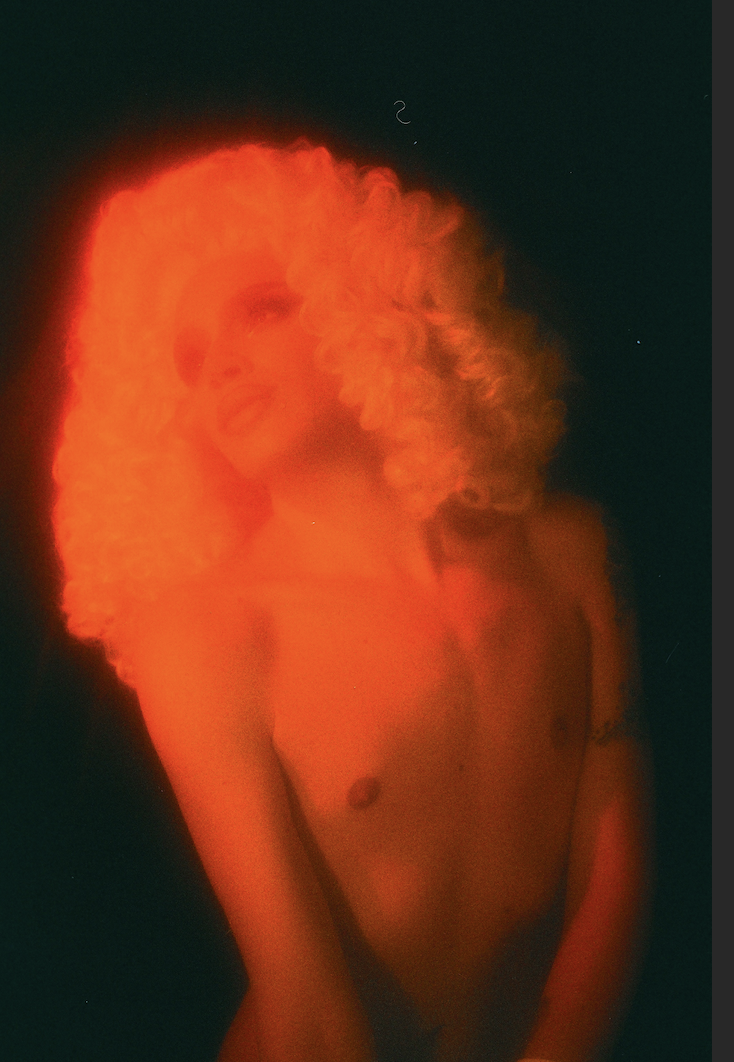HOW MOHAMAD PRACTICES MEMORY

Mohamad Abdouni by Pauline Maroun (Beirut, 2020)
Khaled A.
20 February 2023
Kimo wore her first dress when she was a kid. She’d play an Umm Kulthum song and start performing for her uncle’s wife, who suddenly lost her ability to walk at a young age. Kimo’s dancing brought her joy. It was also the moment Kimo first became aware of her transness. Although she has a wife, three kids, and lives as a cis-man now in Beirut, she defines and speaks fondly of her womanhood on her own terms and beliefs.
Kimo, alongside nine other Lebanese trans* women, is the spotlight of Treat Me Like Your Mother, the fourth edition of Cold Cuts – a photo journal exploring and documenting the different queer and trans cultures of Southwest Asia and North Africa. This edition is a tribute to the women whose stories have been policed and erased for far too long. As Mohamad Abdouni, founding editor-in-chief and creative director of Cold Cuts, highlights, this special edition’s title stems from each of the women’s very specific relationship to motherhood. Some, such as Mama Jad, feel a longing and desire for the pain of childbirth and the warmth motherhood can provide. Others, such as Antonella, was in fact a mother to many children during her stay at an orphanage in Beirut, whereas Jamal Abdo’s life revolves entirely around her own mother.
Kimo, alongside nine other Lebanese trans* women, is the spotlight of Treat Me Like Your Mother, the fourth edition of Cold Cuts – a photo journal exploring and documenting the different queer and trans cultures of Southwest Asia and North Africa. This edition is a tribute to the women whose stories have been policed and erased for far too long. As Mohamad Abdouni, founding editor-in-chief and creative director of Cold Cuts, highlights, this special edition’s title stems from each of the women’s very specific relationship to motherhood. Some, such as Mama Jad, feel a longing and desire for the pain of childbirth and the warmth motherhood can provide. Others, such as Antonella, was in fact a mother to many children during her stay at an orphanage in Beirut, whereas Jamal Abdo’s life revolves entirely around her own mother.

Cover of Treat Me Like Your Mother (2022)
He took his first picture in an elective photography class in college, and he hasn't stopped ever since. Taking photos initially helped Mohamad capture his feelings, so he started taking them to document moments and people that evoked certain emotions in him. But his approach shifted with time – his photography became his way to remember, to create a visual record that will survive a faulty memory. What started as a practice in personal memory later morphed into an organized effort to create a record that will survive a policed collective memory. He dedicated Cold Cuts and his photography to practicing remembering.
![]()
“As queer people, we grew up with the sense that we’re alone in this world,” Mohamad recalls. “But that kind of slowly developed into, ‘I’m alone in this world as a (queer) Arab’ because what we are exists but only in the West, or at least so I thought at the time.”
As he unpacks his earlier encounters with queerness through media, of experiences similar to his that were visually recorded and publicly remembered, Mohamad emphasizes that these representations and stories always seemed distant and foreign. Even when he saw people like Bassem Feghali, a Lebanese comedian and “female-impersonator,” on screen for the first time, he felt like these stories were acceptable because they were discussed in isolation from sexuality or gender identity — they were merely a role or a character these celebrities played. His sense of frustration deepened, but along with it came a sense of curiosity to explore a history so rich yet systematically marginalized. This fascination later pushed him to start documenting these queer cultures across Arab communities, for himself first and now others like him.
![]()
Andrea, part of Doris & Andrea (Beirut, 2019)
Dana Mikhail as The Immortal Woman, part of The Epic Of Gilgamesh for GQ Middle East (2022)
“As queer people, we grew up with the sense that we’re alone in this world,” Mohamad recalls. “But that kind of slowly developed into, ‘I’m alone in this world as a (queer) Arab’ because what we are exists but only in the West, or at least so I thought at the time.”
As he unpacks his earlier encounters with queerness through media, of experiences similar to his that were visually recorded and publicly remembered, Mohamad emphasizes that these representations and stories always seemed distant and foreign. Even when he saw people like Bassem Feghali, a Lebanese comedian and “female-impersonator,” on screen for the first time, he felt like these stories were acceptable because they were discussed in isolation from sexuality or gender identity — they were merely a role or a character these celebrities played. His sense of frustration deepened, but along with it came a sense of curiosity to explore a history so rich yet systematically marginalized. This fascination later pushed him to start documenting these queer cultures across Arab communities, for himself first and now others like him.

“As a photographer, I’m not sure I feel it’s my ‘responsibility’ to [document],” Mohamad declares. “I think it’s a genuine curiosity fueled by a personal frustration, a personal yearning that I want to enrich, enlighten, and cultivate. And while I go about my work very ‘selfishly,’ and for my own sake, I make sure I also package it in a way that makes it very accessible to whoever might share the same frustrations or curiosities.”
Despite these projects starting as a way to find answers to personal questions, the scale of their impact is enormous. And Mohamad doesn’t shy away from that — this archive, alongside his photographic exhibition held in Beirut, is the first in Lebanon and other Arab countries. To create a body of work, as he did in the previous issues of Cold Cuts and other projects, requires building a bond of trust and safety for everyone involved. As a project that has been in the works for over three years, he continued working with every single woman sharing her story, alongside every member of the team and other collaborators. This sense of mutuality and collective responsibility has always been Mohamad’s priority, and it will continue to be.
Despite these projects starting as a way to find answers to personal questions, the scale of their impact is enormous. And Mohamad doesn’t shy away from that — this archive, alongside his photographic exhibition held in Beirut, is the first in Lebanon and other Arab countries. To create a body of work, as he did in the previous issues of Cold Cuts and other projects, requires building a bond of trust and safety for everyone involved. As a project that has been in the works for over three years, he continued working with every single woman sharing her story, alongside every member of the team and other collaborators. This sense of mutuality and collective responsibility has always been Mohamad’s priority, and it will continue to be.

Katia, part of Treat Me Like Your Mother (2019)
Treat Me Like Your Mother became available online for free last May — it is dedicated to Katia, one of the featured women in the collection, who passed away last year. As he promised himself, Mohamad continues to make his work accessible to those who need it the most — people who felt a hunger he thought he experienced alone. And this fulfillment, whether in this collection or another personal project, is of and for people like Katia and Kimo and Em Abd and other trans and queer Arabs whose stories never found a home. * as highlighted in Treat Me Like Your Mother, trans is used in recognition of “transgender, transsexual, trans-feminine, trans-masculine, and trans-non-binary identifying people”

